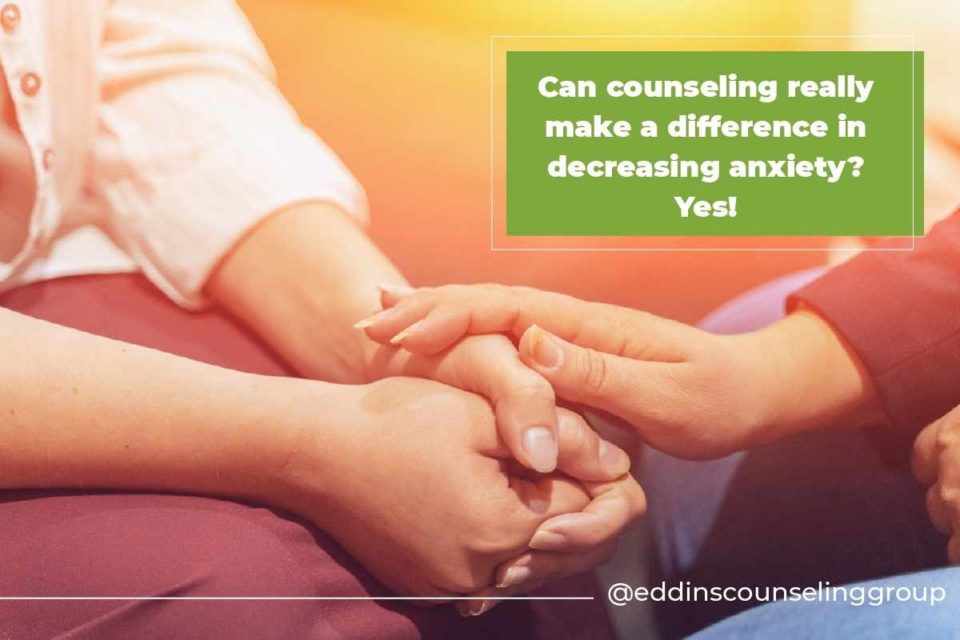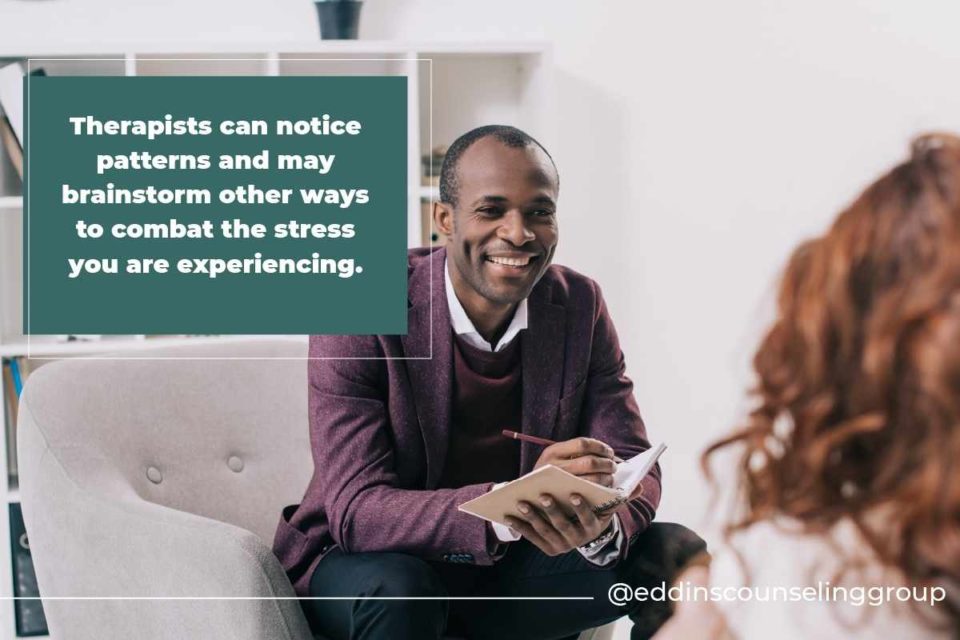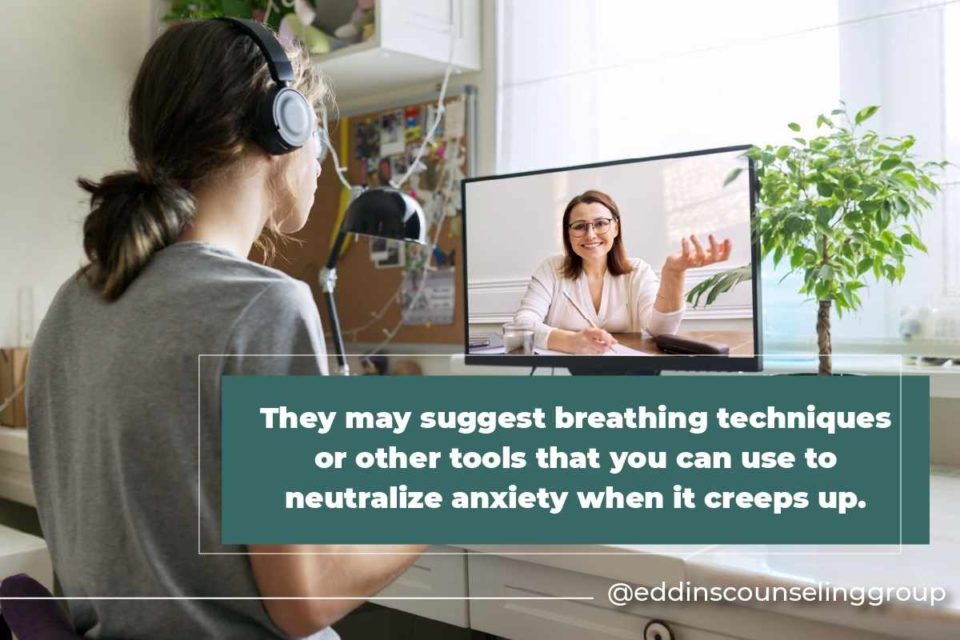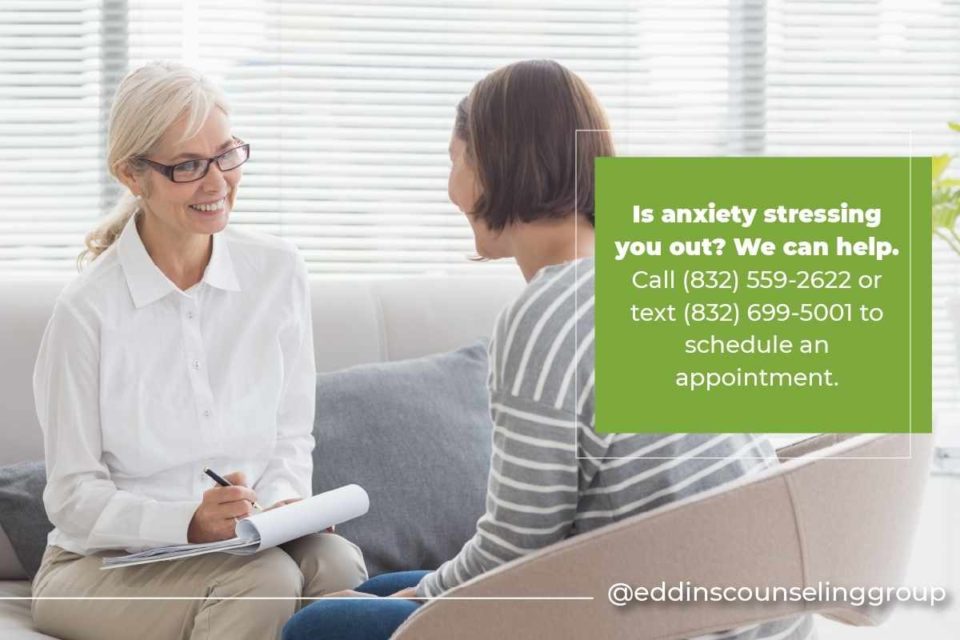November 28, 2022
6 Ways Talking to a Therapist Can Help with Anxiety
Written by Sara Lane
Posted in Anxiety and with tags: therapy, understand anxiety

Talking to a therapist about how you feel may seem incredibly daunting to you. If you’ve never been to counseling before, or if you’ve simply never had a positive experience, the thought of sitting alone across from a stranger can feel overwhelming and intimidating.
But here you are taking a brave first step — you’re reaching out and learning more about yourself and what you can do for your mental health.
Reading this post about how to curb your anxiety is a great way to boost your self-care routine.

How Counseling Really Helps
So how does counseling help, and can it really make a difference in decreasing anxiety and stress?
Here are some inherent aspects of therapy and how it’s being used to help thousands, if not millions, of people with anxiety around the globe.
1. Get to Know Yourself Better
Even if you’re unsure of how much therapy can help with your anxiety, it’s always a great place to get to know yourself better.
Your therapist may point out areas in which you are struggling, places you are excelling, and broaden your appreciation for the ways you handle life’s challenges.
2. Find Mental Health Relief
Therapy can be just one strategy you use to combat anxiety. While medications like Xanax and Buspirone may be helpful in curbing anxiety in the moment, therapy is a great place to work on the triggers that initiate anxiety in the first place.
Studies show that just by being in a room talking to a counselor can improve your mental health significantly.
Even if you’re skeptical about how an hour’s worth of talk time can make a difference in the raging anxiety that you’re experiencing, evidence supports the idea that it’s worth a try.
3. Create a Mental Health Game Plan
When you’re struggling with anxiety, it may be difficult to see anything outside of the fear you’re experiencing. A counselor can walk beside you, and identify any other factors in your life that may be contributing to how you feel.
A good counselor won’t pass judgment on you; instead, they’ll point out what they’re seeing and suggest some strategies for combating the anxiety you feel.
Therapists can also notice patterns that are difficult to see in our own lives. For example, if you feel stressed and uncomfortable when you go to work in the morning, they may point out that your commute is bustling with crowds and stress, and that may be activating your anxiety.
From there, they may suggest alternative methods for getting to work, or they may brainstorm other ways to combat the stress you are experiencing.
Whatever strategy you and your therapist come up with, their goal is to support you and your mental health. You may find that some of these strategies work, and some don’t. And that’s ok – this process can involve a lot of trial and error.
But you don’t have to go on this journey alone.

4. Learning Your Triggers and 5. Finding Coping Strategies
Part of therapy is the development of trigger awareness and anxiety cues to help you when anxiety attacks.
Your counselor may note times and places where anxiety is most prevalent. It could be an environmental trigger (at work, at school, in crowds, talking to peers, etc.) or it could be a situationally trigger.
Wherever the root of anxiety is growing, you and your therapist will take steps to battle it together and develop coping strategies for when the anxiety strikes.
Coping strategies could include medication, but it’s also likely to include in-the-moment coping tools. They may suggest breathing techniques, tactical tools, or visual cues, safe places, or other tools that you can use to neutralize anxiety when it creeps up.

6. Investing in Yourself
Starting a journey of wellbeing with a counselor is a very brave first step. You may not notice improvements overnight, and that’s ok. This process can be hard at first, but if it resolves your anxiety in the long run it may be well worth it.
Sticking with therapy when it gets difficult is not easy to do. Your counselor may walk through painful memories with you to get at the root of your anxiety and they are professionally trained to do so. If, at any point, it becomes too painful, you can always tell your therapist you need to take a break.
Always be honest with your counselor and how the session makes you feel. If you’re having a hard time, it’s good to let them know in the moment.

Next Steps
But at Eddins Counseling Group, we wish you well in your wellness journey, and offer to be here for you whenever you need us.
If you, or someone you know, is stressed out from anxiety, then give us a call (832) 559-2622 or text us (832) 699-5001 to schedule an appointment or to get started today.
We will do our best to pair you with a “best fit” therapist in Houston, Montrose, or Sugar Land – whichever location is most convenient for you!
5 Ways to Reduce Anxiety
Get instant access to your free ebook.
Grounding & Self Soothing
Get instant access to your free ebook.
Create Healthier Thoughts & Feelings
Get instant access to your free ebook.
Why You Feel This Way
Get instant access to your free ebook.
















